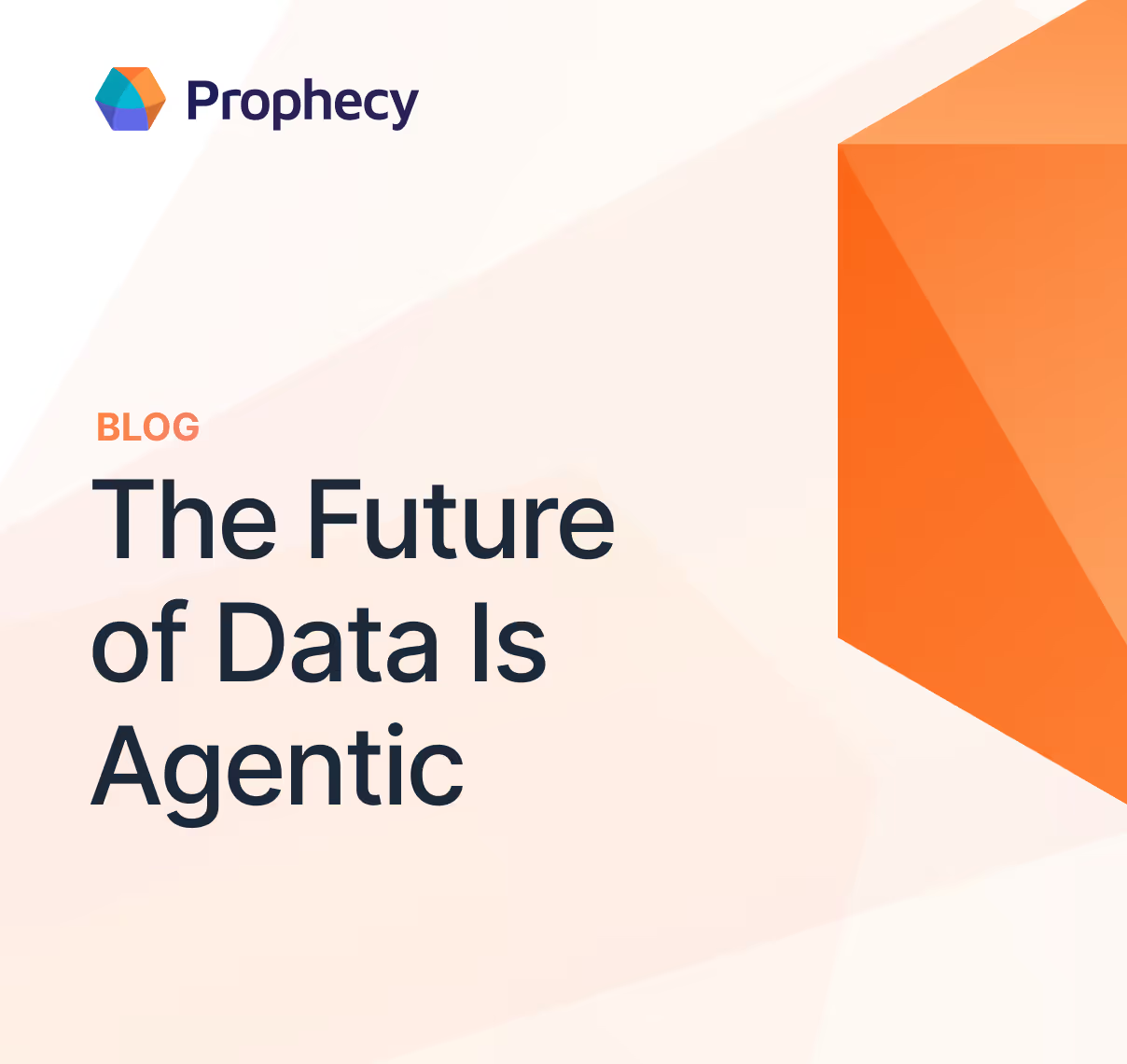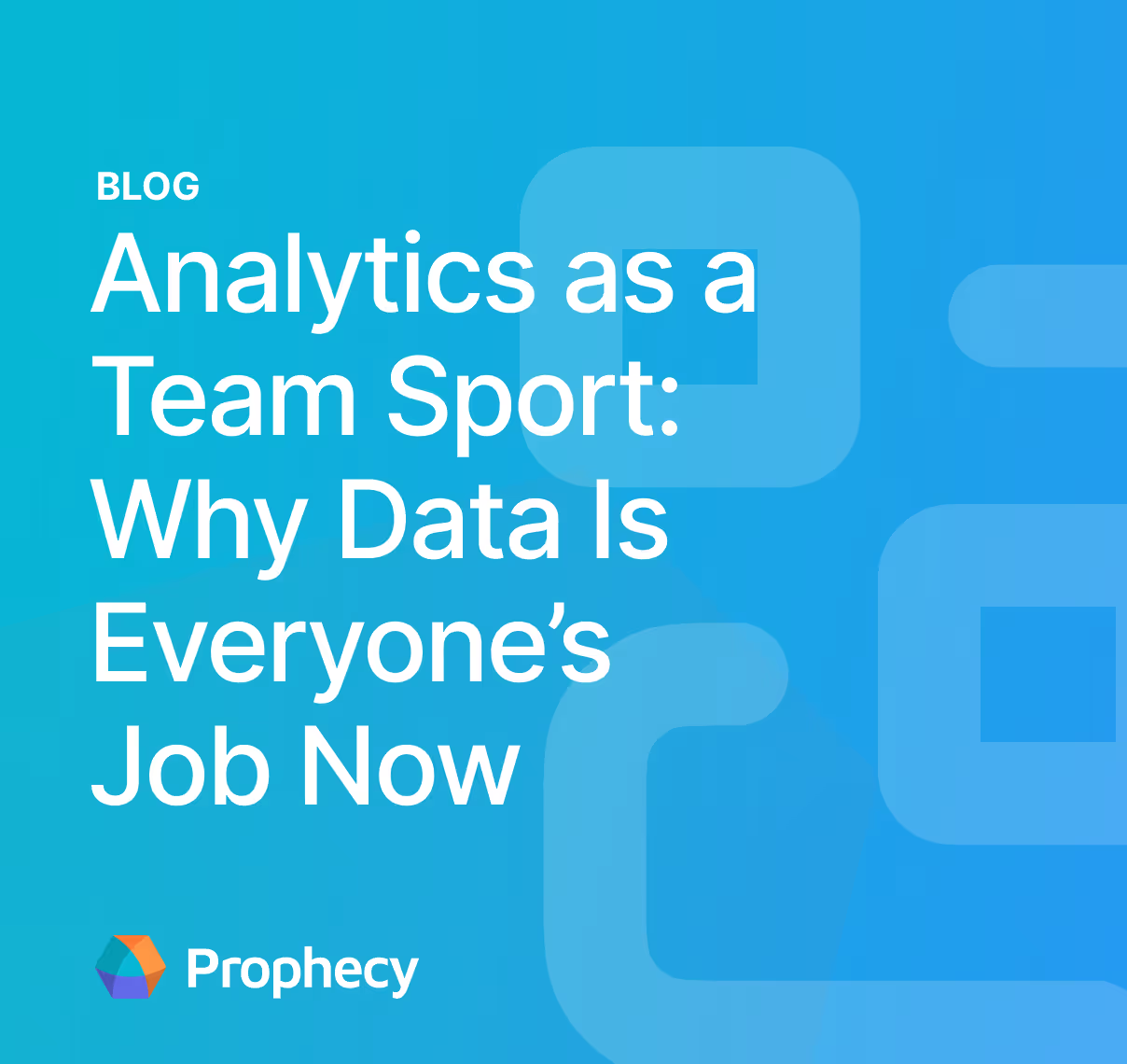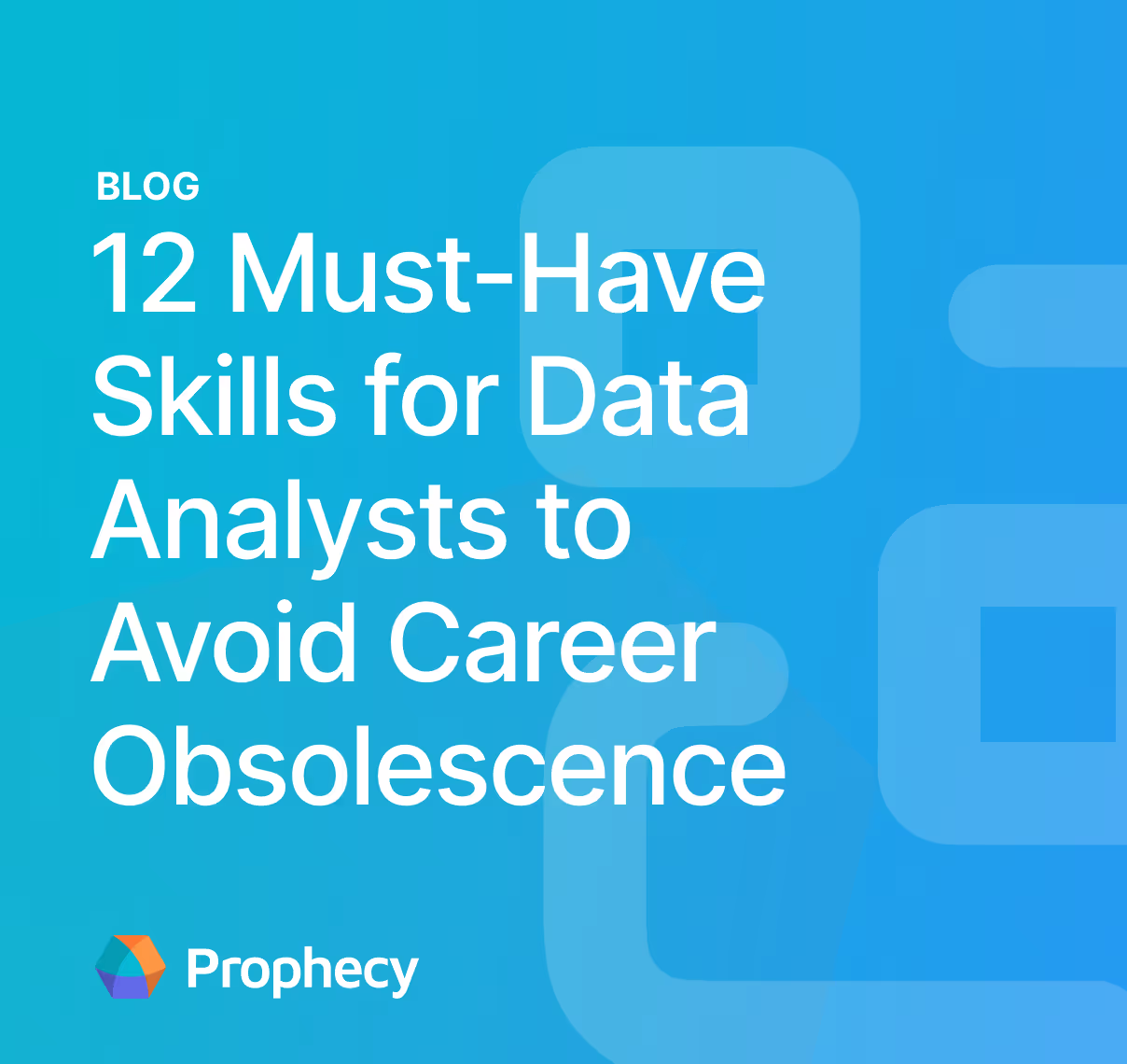How GenAI Is Reshaping Enterprise Data Strategies
Learn about the new demands surfacing from GenAI implementation, and practical solutions for data quality, security, and governance challenges.
The artificial intelligence revolution is fundamentally transforming how organizations think about their data.
If you're leading data strategy at your company, you've likely noticed that GenAI has become both your biggest opportunity and your most complex challenge. The technology promises to unlock insights faster than ever before, with 46% of organizations reporting 31-50% greater productivity with GenAI implementation.
However, it’s also forcing you to rethink everything from data governance to team collaboration.
The positive impact of GenAI
GenAI is delivering remarkable wins for organizations willing to embrace it thoughtfully. The technology is fundamentally changing how teams interact with data, breaking down traditional barriers and accelerating insights across the enterprise.
Some of the benefits organizations are experiencing include:
- Dramatic speed improvements: Teams generate insights in hours instead of weeks, with natural language interfaces that eliminate the need for complex coding. What used to require formal requests, SQL expertise, and lengthy development cycles now happens through simple conversational queries that deliver immediate results.
- True data democratization: Domain experts can interact directly with data using conversational AI, making analysis accessible to marketing teams, finance departments, and product managers without technical backgrounds. Your subject matter experts no longer need to translate their questions through multiple layers of technical teams—they can explore data directly and get answers in their own language.
- Real-time decision making: Business units can spot trends, analyze customer sentiment, and prototype data-driven features without waiting for engineering resources. This immediacy means you can respond to market changes, customer feedback, and operational issues as they happen, rather than discovering them weeks later in monthly reports.
- Reduced organizational silos: Technical and business teams collaborate more effectively, with data scientists focusing on strategic modeling while business analysts gain independence. The traditional bottleneck where business questions got stuck in technical translation is dissolving, creating smoother workflows and better communication across departments.
- Cultural transformation: Data-driven decision making becomes natural for everyone, not just technical experts, creating organization-wide confidence in data insights. When your entire team can interact with data easily, you see a fundamental shift in how decisions get made from gut instinct and politics to evidence-based reasoning.
- Faster time-to-market: Data products reach production faster with reduced dependency bottlenecks and streamlined workflows. Your teams can iterate on ideas, test hypotheses, and refine approaches without waiting for scarce technical resources, dramatically shortening the path from concept to implementation.
- Increased trust and adoption: Business stakeholders actually use the insights they're getting, leading to better business outcomes and higher ROI on data investments. When people can understand how conclusions were reached and explore the data themselves, they develop genuine confidence in the results rather than skepticism about "black box" analytics.
New demands GenAI creates for data teams
GenAI's benefits come with unprecedented demands on your data infrastructure and processes. Your team is probably feeling the pressure from multiple directions as business units discover what's possible with AI-powered analytics:
Trusted, governed data at scale
GenAI's hunger for high-quality data means you can't afford the "garbage in, garbage out" problem anymore. Business users are asking AI to analyze everything from customer interactions to financial forecasts, and they expect accurate, reliable results. This puts enormous pressure on your data governance practices—you need consistent data definitions, clear lineage tracking, and automated quality checks that can keep pace with AI's speed of analysis.
Faster data access and processing
Business teams now expect near real-time access to fresh data, and they want to iterate quickly on their analysis. Your infrastructure needs to support this velocity without sacrificing accuracy or breaking compliance requirements. You're essentially being asked to make data as accessible as a web search while maintaining enterprise-grade security and governance.
Support for self-service analytics
GenAI has shown business users what's possible when they can interact with data directly, creating permanent expectations for this capability. Your challenge is enabling this self-service capability without creating ungoverned analysis that leads to conflicting metrics and compliance risks. You need platforms and processes that give business users autonomy while maintaining the guardrails that keep your organization safe and consistent.
Challenges with GenAI implementation and how to overcome them
Despite its promise, implementing GenAI in enterprise environments comes with significant hurdles. Here's how to navigate the most common challenges:
Data quality and consistency issues
GenAI amplifies data quality problems in dangerous ways. Traditional reports might show obviously wrong numbers, but GenAI can take poor-quality data and generate confident, plausible insights that lead to major business decisions. Inconsistent customer data, missing values, or integration bugs become "trends" that seem real but are actually data artifacts. When your marketing team discovers 40% of "high-value" customers haven't purchased in two years due to a data bug, the damage extends far beyond bad reports to misdirected strategy and wasted resources.
Strategies to address data quality:
- Implement automated data validation rules that check for completeness, accuracy, and consistency before data enters your AI workflows
- Create standardized data preparation processes that clean and normalize data from different sources
- Establish clear ownership and accountability for data quality across business domains
- Build monitoring systems that alert you when data quality metrics fall below acceptable thresholds
- Invest in data profiling tools that help you understand and document your data landscape
Security and privacy concerns
GenAI creates entirely new security vulnerabilities most organizations aren't prepared for. GenAI systems need access to vast amounts of sensitive information across your organization, creating concentrated targets for attackers. These models can inadvertently memorize and regurgitate sensitive information, while their conversational interfaces make it easy for users to accidentally share confidential data. For regulated industries, a single misconfigured GenAI system could violate GDPR, HIPAA, or financial regulations across thousands of interactions, creating compliance nightmares.
Strategies to strengthen security:
- Implement role-based access controls that limit data exposure based on user responsibilities and business needs
- Use data masking and anonymization techniques to protect sensitive information in non-production environments
- Create audit trails that track how data is accessed, used, and transformed throughout your AI workflows
- Establish clear policies for data retention and deletion in AI training and inference systems
- Conduct regular security assessments specifically focused on AI/ML workflows and data pipelines
Governance at AI speed
The fundamental tension in GenAI implementation is that governance processes are designed for careful deliberation, but GenAI enables rapid experimentation and immediate insights. Your existing approval workflows might take weeks, but GenAI users expect answers in minutes. This creates a challenging scenario where you must either slow down GenAI to match governance processes and kill its value proposition, or let it operate without proper oversight and create chaos with conflicting metrics.
Strategies for agile governance:
- Embed governance controls directly into your data platforms rather than treating them as separate approval processes
- Use self-service governance tools that let business users understand and comply with data policies without manual intervention
- Establish automated policy enforcement that prevents unauthorized data usage while allowing legitimate experimentation
- Build governance frameworks that scale with your AI initiatives rather than creating bottlenecks
- Develop clear escalation paths for when automated governance systems flag potential issues
Enable GenAI success at enterprise scale with Prophecy
Prophecy was built to solve the challenges that come with GenAI adoption. As an AI-powered, governed self-service data platform, Prophecy bridges the gap between GenAI's need for speed and enterprise requirements for control, compliance, and quality. Instead of forcing you to choose between fast GenAI innovation and proper data governance, Prophecy embeds governance directly into your data workflows, making compliance invisible to users while maintaining the rapid iteration that makes GenAI so powerful.
- Powerful AI agent: Prophecy's AI agent uses natural language processing to help you build GenAI-ready data pipelines. Describe what you need in plain English—like "prepare customer interaction data for sentiment analysis"—and the AI generates visual workflows and production-ready code automatically. Your teams can create data pipelines for GenAI in hours instead of weeks.
- Governed self-service: Instead of creating ungoverned chaos when teams experiment with GenAI, Prophecy provides true self-service with embedded governance. Marketing can access customer data, finance can prepare forecasting data, and operations can build real-time feeds—all while automatically following your data policies and compliance rules without manual oversight.
- Automated data quality: Since GenAI amplifies data quality problems, Prophecy automatically generates data quality tests and validation rules as you build pipelines. The platform continuously monitors data freshness, completeness, and consistency, ensuring your AI insights are based on reliable data and eliminating the "garbage in, garbage out" problem.
- Enterprise integration: Prophecy integrates natively with platforms like Databricks, Snowflake, and BigQuery, while generating standard Spark and SQL code that you own completely. Deploy GenAI data workflows that leverage your current infrastructure without vendor lock-in, maintaining flexibility to evolve your technology stack as GenAI capabilities advance.
Learn more about overcoming challenges and unlocking opportunities with GenAI in our ebook, The impact of GenAI on data teams.
Ready to give Prophecy a try?
You can create a free account and get full access to all features for 21 days. No credit card needed. Want more of a guided experience? Request a demo and we’ll walk you through how Prophecy can empower your entire data team with low-code ETL today.
Ready to see Prophecy in action?
Request a demo and we’ll walk you through how Prophecy’s AI-powered visual data pipelines and high-quality open source code empowers everyone to speed data transformation
Get started with the Low-code Data Transformation Platform
Meet with us at Gartner Data & Analytics Summit in Orlando March 11-13th. Schedule a live 1:1 demo at booth #600 with our team of low-code experts. Request a demo here.
Related content
A generative AI platform for private enterprise data
Introducing Prophecy Generative AI Platform and Data Copilot
Ready to start a free trial?
Lastest posts

The Future of Data Is Agentic: Key Insights from Our CDO Magazine Webinar

Analytics as a Team Sport: Why Data Is Everyone’s Job Now




